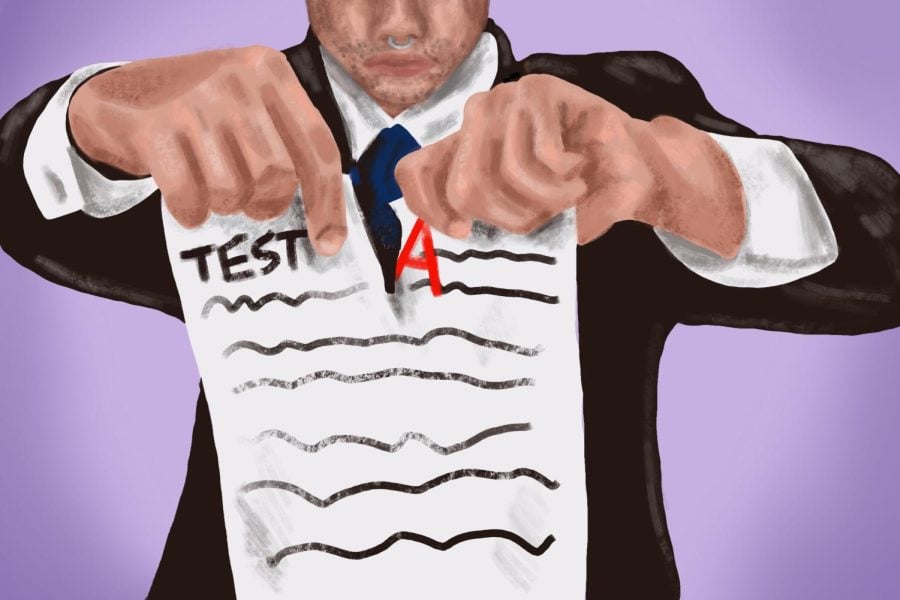NU professors prioritize self-assessment in alternative grading methods
Professors at NU are looking at ways around the traditional form of grading in their classes.
April 16, 2023
Political science Prof. Sirus Bouchat tells his students at the start of every quarter that he understands if his class is not their main priority.
Bouchat said they don’t want their students to feel uncertain about their grade when they’re “giving 100%”. Rather, a student’s grade is based on effort, they said.
“You might decide that this class is not that important to you, and that you have other classes that you want to give a higher priority,” Bouchat said.
Bouchat implements several alternative forms of grading like “contract grading” and “autonomous grading.” Contract grading, he said, allows students to choose from a “menu” of assignments they think will be the most interesting and challenging for them. Autonomous grading relies on more self-assessment, and he said he uses it more commonly with his graduate students.
In political science classes that incorporate more math and statistics, Bouchat said he aims to make the material more accessible by allowing unlimited attempts on quizzes and leaving individual feedback for students.
“I find that students, particularly students in the social sciences who don’t have a lot of familiarity with (math), get very easily overwhelmed,” Bouchat said. “I was looking for ways to … invite students to participate in learning without having all of this triggered fear of performance.”
History Prof. Sarah Cushman uses a portfolio grading style, where students compile and revise their assignments throughout the quarter. Cushman said she avoids sticking with more conventional forms of grading just for the sake of tradition. She said grading is a relatively new practice in the grand scheme of education, and she wonders if it still serves its original purpose.
Letter grading did not become popular until the 1940s, according to Life Sciences Education, and it was created with the purpose of standardizing education.
“I don’t think that we can equate less traditional forms of grading with less rigor,” Cushman said. “It just means that there’s a different form of assessment.”
They said their cumulative grading style helps students learn time management skills and take responsibility for their education.
Cushman incorporates learning objectives into her class, allowing her students to self-reflect. As an undergraduate student, she said, she often wrote her papers the night before they were due with no revision, but in graduate school she began revising everything. She hopes revision aids in the learning process for her students.
“If the student is working for a grade and not for knowledge, then how is that serving their education?” Cushman said.
Communication freshman Tyler Callahan said his teacher used a non-traditional form of grading in a theatre course. He said the class focused on how cognitive research can translate to live performance.
Callahan said the grading style confused him at times. The course involved a pair of paths on each assignment: a writing option and presentation option. Both options had different deadlines.
“It was a little bit hard to keep up with,” Callahan said. “I turned in some things like a couple of days late, but she was very forgiving about that.”
Although Callahan appreciated having the choice of assignment format, he said he would have found one path easier to follow.
Callahan said he could see how the options would be helpful in playing to student’s strengths and not restricting them based on the assignment format, with some students being better at writing and others at presenting.
But Callahan said he thought some of the two-path assignments were difficult to understand.
“If you’re a teacher and you’re trying to figure out one system of grading, it would be better to have one really thought-out idea for an assignment rather than two half-baked ideas,” Callahan said.
Correction: A previous version of this story misstated Tyler Callahan’s instructor’s position. The Daily regrets the error.
Email: luiscastaneda2026@u.northwestern.edu
Twitter: @LuisCasta220
Email: samanthapowers2026@u.northwestern.edu
Twitter: @SQPowers04
Related Stories:
— Students demand Northwestern renews Credit/No Credit grading policy
— Northwestern implements temporary Credit/No Credit grading option


